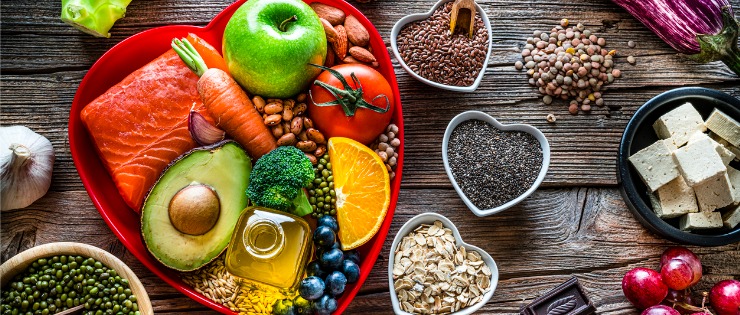
When it comes to cholesterol levels, our overall awareness has definitely increased over the last decade, but most adults don’t know what their cholesterol levels are and if they are too high. There are no symptoms or signs of high cholesterol, so it’s important to get a check. High cholesterol increases the risk of developing heart disease and stroke.
What is Cholesterol?
Cholesterol is a waxy, fat-like substance. Our livers produce around three quarters of cholesterol, while the other quarter is consumed through food. The amount of cholesterol our bodies produce is enough - we don’t actually need to eat foods that contain cholesterol to stay healthy. Also known as lipids, cholesterol is in the membranes of every cell in the body including the brain, nerves, muscles, liver, intestines and skin.
The fatty substance is essential for metabolic processes such as:
Building the cell membrane structure.
Helping our metabolism work efficiently.
Producing vitamin D.
Making oestrogen, testosterone and adrenal hormones.
Producing bile to help digest fat and absorb nutrients.
What is Considered to Be a Healthy Cholesterol Level in Australia?
Cholesterol is measured in millimoles per litre. There is no longer an age-based recommendation for cholesterol. It was once thought that high cholesterol levels were less of a problem as we age, but it’s now considered beneficial for elderly people to lower their high cholesterol level.
| | HDL (Good) Cholesterol | LDL (Bad) Cholesterol | Triglycerides |
High Cholesterol | 1.5 mmol/L | >4.5 mmol/L | >2.5 mmol/L |
Borderline Cholesterol | 1.5+ mmol/L | 3.6-4.5 mmol/L | 1.8-2.5 mmol/L |
Desirable Cholesterol | 1.5+ mmol/L | 1.7-3.5 mmol/L | 0.5-1.7 mmol/L |
HDL + LDL + 20% Triglycerides = Total Cholesterol |
A desirable cholesterol level is between 3.9-5.5 mmol/L. Borderline is 5.5-6.5 mmol/L while high is greater than 6.5 mmol/L. Health experts recommend that Australian adults have a cholesterol level that is no higher than 5.5 mmol per litre. You can download a copy of the Cholesterol Guide from the Victor Chang Cardiac Research Institute for easy reference.
Males are more likely to have higher levels of LDL than women, but women after menopause have an increased risk of high cholesterol.

You can check your risk of absolute cardiovascular disease using the CVD Check Calculator. However, it’s best to only use the calculator as a guide. The CSIRO recommends speaking with your GP as the online tool has limitations such as not taking into account family history.
Problem with Too Much Cholesterol
High cholesterol means you are at risk of cardiovascular disease, such as heart disease. The increased risk is due to cholesterol building up inside the arteries that carry blood to the heart. The buildup causes less blood and oxygen getting to the heart, which can cause a heart attack.
High levels of cholesterol also places you at higher risk of a stroke. Increased risk of ischemic stroke is caused by a clogged artery in the brain. Blood clots are often caused by excess plaque buildup which can travel to the brain and become stuck in an artery, causing the stroke. Plaque is a fatty substance that is made up of cholesterol, calcium, febrin and the cell’s waste products. Plaque causes arteries to narrow and stiffen, restricting blood flow.
Types of Cholesterol and Triglycerides
There are two main types of cholesterol, though triglycerides should also be considered in this discussion as they come into the calculation to help determine cholesterol levels.
LDL Cholesterol
Low-density lipoprotein (LDL) cholesterol is known as the ‘bad’ cholesterol. It transports cholesterol from the liver to other cells. This type of cholesterol can contribute to the buildup of plaque, which can narrow and clog arteries.
HDL Cholesterol
High-density lipoprotein (HDL) cholesterol is known as the ‘good’ cholesterol. This healthy cholesterol helps clear LDL cholesterol from the arteries. This reduces the risk of stroke. Unlike LDL cholesterol, you want to have higher levels of HDL cholesterol in your blood.
Triglycerides
Triglycerides are a type of fat that’s found in the blood. The body converts extra calories into triglycerides, which are stored in fat cells. High triglycerides are caused by eating more calories than are burned. A person with high triglyceride levels, high LDL or low HDL has an increased risk of plaque buildup in their arteries.
The total cholesterol number is the sum of the LDL and HDL cholesterol levels, and 20% of the triglyceride levels.
Testing for Cholesterol
It’s recommended that people over the age of 45 (or 35 for Aboriginal or Torres Strait Islanders) be tested for cholesterol every five years. People with high blood pressure or diabetes may need more regular testing.
The test usually involves fasting (only drinking water) for between eight and 12 hours before having a cholesterol blood test. The results of the test will include:
The total amount of cholesterol in the blood.
The level of HDL-cholesterol (often called good cholesterol).
The level of LDL-cholesterol (often called bad cholesterol).
Triglycerides (another type of fat in the body).
If you have a high level of LDL cholesterol and triglycerides, then you have an increased risk of heart disease and stroke. A GP may also consider your age and blood pressure when determining your risk of heart disease and stroke.
If your levels of cholesterol and lipids go down, then your risk goes down too.

Causes of High Cholesterol
High cholesterol is caused by a range of factors - some are inherited and some occur later in life due to lifestyle choices. Some of these causes include:
Too Many High-Fat Foods
Eating too many saturated fats and trans fats can cause high levels of LDL cholesterol.
Too Many Calories
You can reduce your risk of high cholesterol by only consuming the calories that your body can burn. Extra calories are converted into triglycerides which cause a buildup of plaque in your arteries.
Not Enough Exercise
When you’re not physically active, it can lead to higher triglycerides, high cholesterol levels and increased risk of stroke.
Older Age
As we age, it becomes harder for the body to remove cholesterol from the blood so it can build up leading to higher cholesterol levels.
Familial Hypercholesterolemia
Familial hypercholesterolemia (FH) is a genetic condition where the body is unable to remove LDL cholesterol from the blood, causing high LDL levels. Around 1 in 300 people have FH in Australia but 80% are yet to be diagnosed. FH can cause premature coronary heart disease.

Lowering Your Cholesterol
If your test results show you have a high LDL level and low HDL, there are some lifestyle changes you can make to help improve your levels. These include:
Maintaining a healthy weight.
Exercise for a minimum of 30 minutes daily.
Limit your alcohol intake.
Quit smoking (if you smoke).
Reduce your salt intake.
Eat a healthy diet.
If changes to lifestyle aren’t enough to lower your cholesterol, your GP may prescribe medication to improve your levels.

Best and Worst Foods for Cholesterol
Foods that are high in cholesterol are some of the most loved that should only be consumed as a treat, not often. Choosing healthier options for your heart on a regular basis can make a big difference.
Best Foods for Cholesterol
Eating a diet high in fibre can help lower cholesterol levels. The fibre binds to excess cholesterol and removes it from the body.
Omega-3 foods - eating fish and plant foods such as chia seeds and brussel sprouts that are high in omega-3s can improve HDL cholesterol levels.
Fresh fruit and vegetables - soluble fibre found in apples and oranges stps bile acid being absorbed by cells in our body which reduces bad LDL and increases good HDL cholesterol.
Whole grains - another high fibre food, whole grains keep you fuller for longer to stop the cravings and prevent sugar spikes. Eating whole grains rather than highly processed carbohydrates can reduce the cholesterol levels in the liver.
Eating a healthy diet, getting plenty of exercise and a good night’s sleep can all contribute to a healthy lifestyle and reduce your chance of having a high cholesterol level.

Worst Foods for Cholesterol
Eating foods that have a high fat content can increase your cholesterol levels.
Fatty red meat - meat with a high fat content contains some of the highest levels of trans fats. Processed meats such as sandwich meats and sausages contribute to high cholesterol levels. Instead, look for meat that is labelled as heart smart and trim any visible fat from meat. Limit the high fat, processed red meat and choose leaner meats like turkey and chicken.
Coconut Milk - both coconut milk and cream are high in saturated fat. It’s also high in sugar, calories and can cause weight gain - all contributing factors to high cholesterol. Cashew milk is ideal for cooking because it has the same nutty consistency as coconut milk with the fat content.
Duck - duck has a higher level of cholesterol than other game meat. For a lower cholesterol level, choose chicken or turkey for the lowest level.
Butter and Margarine - high in saturated or trans fat, use butter and margarine sparingly or use olive, canola, flaxseed or walnut oil in cooking.
Canned Fish in Oil - fish contains plenty of good fats including omega-3. But you cancel out the health benefits when it’s packed in oil. Choose fish in spring water rather than oil.
Health Insurance for Heart Health
We know heart health is extremely important. With certain hospital policies, HIF will cover the cost of hospital investigation and treatment of the heart, heart-related conditions and vascular system.